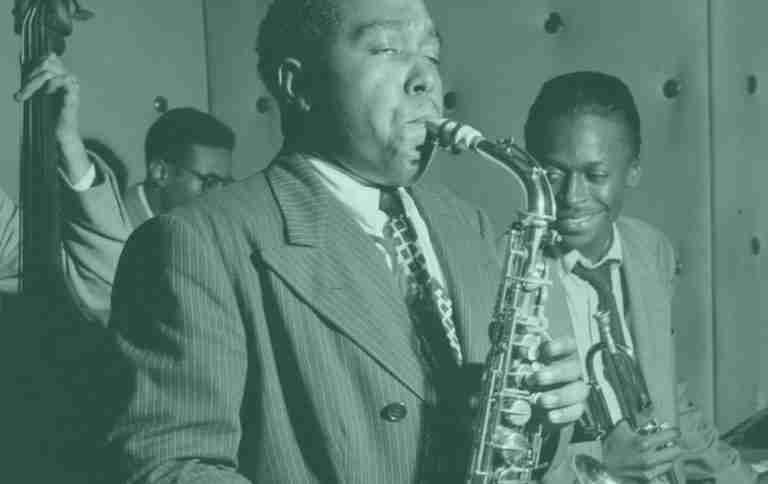Why is it so difficult to learn jazz standards even when we have access to so much information about each and every one? We can bring up recordings with a few clicks of mouse via Youtube, we can find plenty of fakebooks with the chords and melody written out for us if we’re too lazy to learn them from recordings, and we can even slow down anything that’s too fast for us in programs like Transcribe…
With all these resources at our disposal and even using them, how is it that we still have trouble with the jazz standard repertoire?
It comes down to one main thing: we’re bored with standards.
Why we’re bored with standards
The jazz standards come from the “Great American Songbook.” Essentially, songs that infiltrated Broadway musicals and popular movies of the past were adopted and modified by jazz composers and performers to create versions of a tune for the jazz idiom.
Why was it so easy and natural for the legends of this music to learn these songs? Simply put, because it was the pop music of their time. For instance, Charlie Parker was born in 1920. Body and Soul was written in 1930, All The Things You Are in 1939, and Stella By Starlight in 1944. So Parker was 10, 19, and 24, when these three standards came out. He grew up with this music! Not growing up the music you’re going to play is a huge disadvantage.
Chances are, you grew up with the Beatles, the Talking Heads, or Nirvana. The music you grew up with sticks with you for a lifetime. For better or worse, Pearl Jam, Weezer, and Green Day will be with me forever. So, while Bird was listening to the music popular during his time, he was connecting with the music that he too would be performing, whereas for us to listen to these songs, we have to take a trip to the past.
To take this trip to the past, we sometimes listen to recordings, but when we practice we often turn on a play-along. There are excellent ways to practice with play-alongs, but if you haven’t firmly established the tune in your mind, this play-along record becomes the version of the song you hear in your head.
You tell me: Would you rather have Bird playing in your mind, or a play-along record? I’d hope you’d choose Bird, but if you really love the play-along recordings that much, be my guest.
Once the tune is firmly established in your mind in this stale uninspired way, it’s difficult to change. Think about tunes like All The Things You Are. When you learned it, did you spend more time listening and playing with a real-recording, one you love, something that inspires you, or did you go straight to the play-along?
No wonder you think you sound geeky, dated, and uninspired when you play certain standards. The version burned into your mind of these standards is from a geeky and uninspired version.
Getting excited about standards
Just because you didn’t grow up with the music and you’ve been putting lame versions of the tunes into your head doesn’t mean that you have to accept your fate that you’ll always think certain standards are boring.
Even if you don’t consciously think this, you may well have these feelings when you examine your thoughts closely. Ask yourself how you truly feel about songs like Stella By Starlight. Do you think, “Beautiful. Lyrical. Elegant.” or…do you think, “Tiresome. Complicated. A chore.”
It all goes back to how you approached these tunes when you learned them. For example, if I had the latter thoughts about Stella, I most likely have never heard someone play beautifully on it and I probably learned it strictly from a play-along, never bothering to listen to recordings of it.
The good thing is, it’s never too late.
So, what’s the most important part of learning tunes? Is it the melody? The chords? Is it how well you play your “stuff” over it?
Before all of these more mechanical endeavors comes the most important step: you must get excited about the tune you want to learn. Trying to play a tune you think is boring (even unconsciously) will only make you feel and sound more bored. Come out of the gates excited. This is the most important thing about learning standards.
To do this, find a version of the tune that resonates with you, not even one that you want to transcribe or play with necessarily, just one that blows you away; something that makes you say to yourself, “Wow, I had no idea that was ever possible on that stupid tune!”
Your attitude towards the tune will completely change. Rather than thinking of it as a limited and boring stupid song, you’ll see possibility. You’ll start to hear the song the way the composer did or how the people did during the time when it was considered pop music. You’ll even enjoy listening to it. Wait, shouldn’t you enjoy listening to something you want to play? Yes. You certainly should.
So start there and find something that knocks your socks off. It doesn’t have to be uber technical or fast either . For instance, when I first heard Gerry Mulligan and Paul Desmond play All The Things You Are, it totally shattered my boring-paradigm of the tune. Listen to how lyrical they are. You almost forget that they’re playing over chord changes, as they just sing from their horns.
By finding a version of the tune that vibes with you, you’ll ingrain (or re-ingrain if you’ve spent too much time with play-along versions) the tune in your mind in an exciting way. Once you’ve got that, then you’ll feel much more motivated to learn the song. It won’t even feel like work because you’ll actually be in to what you’re doing.
Once you’ve got the tune operating in your mind in a non-lame way, explore what your heroes do on recordings to make the tune their own. Do they play an intro? An interlude? Do they play the melody in a specific way? Do they play different chord changes than the norm? What’s the tempo and key?
All these elements have an impact on how the tune sounds. Why pigeon-hole yourself into playing a tune in one specific way because a play-along only plays it one way? No one says a tune has to be in a specific key, at a certain tempo and style. We unconsciously give up this power and let others predetermine how we should perform a song. And then we complain that we’re bored with them??!! We’re bored because our reference point is limited.
There’s no reason to ever be bored with standards. They are endless with possibility. Just expand your reference point.
Listen to Coltrane play On Green Dolphin Street and notice the tagged phrase at the end of the form during the melody and between each solo. This simple addition adds a lot to this tune.
https://www.youtube.com/watch?v=ePScRElDHOYNow listen to Getz play Stella. Notice how he plays the melody differently than books write it out or other people play it. Learning to play the melody your way is something you should always aim to do and something that will make you much more excited about playing it.
And now listen to Joe Henderson on Without a Song and pay close attention to his changes and how they differ from the original; this is another way to spice up a standard you’re bored with, something you should try only after you’ve truly learned to play on the original form.
We’re bored with standards because they are not the music of our time and because we’ve exposed ourselves to contrived versions of them. We so badly want to play well over them, but feel little in common with them. We need to realize that the most important part of learning the jazz repertoire is to get excited about it and learn how to create connections with it.
By finding versions of the tunes that resonate with, versions we actually love listening to, and immersing ourselves in them, we take a step in the right direction in forming bonds with these songs. We then must explore further what various performers have done with all the aspects of the tune. By approaching standards this way and developing a true connection with the jazz standard repertoire, we’ll see–or more accurately hear–endless possibility where before, we saw nothing.










